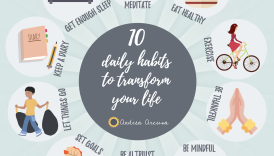The Surprising Ways a Healthy Life Boosts Your Mood and Mental Health

In today’s fast-paced world, the connection between physical health and mental well-being has become increasingly apparent. Many individuals are beginning to realize that attending to their physical bodies can significantly enhance their mental clarity and emotional stability. It’s not just about hitting the gym or following a strict diet; understanding the holistic approach to mental health is paramount.
- The Surprising Ways a Healthy Life Boosts Your Mood and Mental Health
- The Holistic Approach
- The Relationship Between Physical Activity and Mental Health
- Physical Exercise and Endorphin Release
- Impact of Exercise on Stress and Anxiety Levels
- Importance of a Balanced Diet for Mental Well-being
- Nutrient-rich Foods and Mood Regulation
- Link Between Gut Health and Mental Health
- Quality Sleep as a Key Component of Mental Wellness
- Benefits of Adequate Sleep on Cognitive Function
- Lack of Sleep and its Impact on Emotional Stability
- Hydration and Mental Clarity
- Role of Water in Cognitive Function
- Dehydration and Mood Changes
- Sunlight Exposure and Vitamin D for Improved Mood
- Connection Between Sunlight and Serotonin Production
- Vitamin D Deficiency and Its Effects on Mental Health
- Social Connections and Mental Well-being
- Importance of Strong Social Support Networks
- Loneliness and Mental Health Risks
The Holistic Approach
Embracing a holistic approach means recognizing the interplay of various factors affecting mental health. This involves:
- Engaging in regular physical activity.
- Maintaining a balanced diet rich in nutrients.
- Ensuring adequate sleep.
- Staying hydrated.
- Spending time in sunlight.
- Cultivating strong social connections.
These components work together to create a more balanced and fulfilling life. For example, Sarah, a working mother, found that integrating just 30 minutes of daily exercise not only boosted her energy levels but also helped her cope with stress more effectively. Similarly, better dietary choices transformed not just her physical health but improved her mood and outlook on life. As we delve deeper into each aspect, it will become clear how interconnected these elements are and how they can contribute to a more vibrant mental state and overall well-being. By exploring these relationships, readers will gain practical insights to incorporate into their daily lives for improved mental health.
The Relationship Between Physical Activity and Mental Health
Understanding the relationship between physical activity and mental health is crucial as we navigate the challenges of modern living. Just as Sarah discovered the uplifting effects of exercise, many people find that engaging in physical activities significantly enhances their mental health.
Physical Exercise and Endorphin Release
One of the most fascinating aspects of physical exercise is the release of endorphins—often referred to as “feel-good” hormones. These natural chemicals are produced by the body during exercise and help combat feelings of pain and stress. The surge of endorphins can lead to a sensation known as “runner’s high,” which can boost one’s mood almost instantly.
- Benefits of Endorphins:
- Elevate mood and promote feelings of euphoria.
- Decrease perception of pain.
- Enhance overall sense of well-being.
For instance, John, who struggled with seasonal depression, found that by taking daily walks, he could significantly reduce his feelings of lethargy and unhappiness.
Impact of Exercise on Stress and Anxiety Levels
In addition to endorphin release, regular exercise acts as a natural stress reliever. Physical activity helps lower levels of the body’s stress hormones, such as cortisol. The relationship unfolds as follows:
- Regular Exercise Reduces:
- Anxiety by promoting relaxation.
- Symptoms of depression.
- Feelings of stress through distraction and engagement.
After incorporating a simple routine of yoga and jogging, Lisa, a busy college student, reported a noticeable decline in her anxiety levels, crediting her newfound focus and calmness to physical activity. This example illustrates just how versatile and impactful exercise can be on one’s mental health journey.
Importance of a Balanced Diet for Mental Well-being
As we continue to explore the various facets of mental health, it’s essential to understand the profound impact of diet on our emotional state. Just like physical activity, nutrition plays a pivotal role in maintaining mental well-being.
Nutrient-rich Foods and Mood Regulation
A balanced diet filled with nutrient-rich foods can significantly influence mood regulation. Foods that are high in vitamins, minerals, and omega-3 fatty acids are particularly beneficial for mental health. Consider the following key nutrients:
- Omega-3 Fatty Acids: Found in fish, flaxseeds, and walnuts, these are known to boost serotonin levels, enhancing mood.
- B Vitamins: Essential for mood regulation and overall brain health, they can be found in leafy greens, whole grains, and eggs.
- Antioxidants: Present in fruits and vegetables, these protect the brain from oxidative stress, promoting better cognitive function.
Maria, a former junk food enthusiast, noticed a remarkable change in her mood after switching to a diet rich in fruits and vegetables. She felt her energy levels soar alongside an uplift in her mood.
Link Between Gut Health and Mental Health
The gut-brain connection has garnered significant attention in recent years. What many people don’t realize is that a healthy gut can positively affect mental health.
- Gut Microbiome and Mood: A balanced gut microbiome can lead to the production of neurotransmitters like serotonin, which is often dubbed the “happy hormone.”
- Fermented Foods: Incorporating foods like yogurt, kimchi, and sauerkraut can promote gut health, thus enhancing your mood and overall mental clarity.
Tom, who struggled with anxiety, found that after introducing more probiotics into his diet, he felt more balanced and less anxious. This connection between diet and mental health highlights the importance of being mindful about food choices.
Quality Sleep as a Key Component of Mental Wellness
Having discussed the impact of a balanced diet on mental health, it’s equally vital to emphasize the significance of quality sleep. Sleep is often underrated in its influence on mental wellness, but it plays a crucial role in how we think, feel, and function daily.
Benefits of Adequate Sleep on Cognitive Function
Getting enough sleep is essential for optimal cognitive function. During deep sleep, our brains process and consolidate information, making it easier to recall and apply later.
- Key Benefits of Adequate Sleep:
- Improved memory retention.
- Enhanced problem-solving skills.
- Increased attention span and focus.
- Better decision-making capabilities.
For instance, Alex, a graduate student, noticed that after prioritizing sleep over late-night studying, his grades improved dramatically. He attributed this change to better focus during lectures and more effective studying.
Lack of Sleep and its Impact on Emotional Stability
Conversely, inadequate sleep can wreak havoc on emotional stability. Sleep deprivation is linked to a heightened risk of mental health issues such as anxiety and depression.
- Consequences of Sleep Deprivation:
- Increased irritability and mood swings.
- Heightened stress response.
- Difficulty managing emotions.
Emma, a young professional, often pulled all-nighters to meet deadlines, which left her feeling overwhelmed and emotionally drained. Once she started prioritizing sleep, she discovered a newfound resilience against daily stressors. The connection between sleep quality and emotional balance underscores why it’s vital to make sleep a priority in one’s mental health routine.
Hydration and Mental Clarity
Having explored the critical aspects of sleep in maintaining mental wellness, let’s now dive into another often-overlooked component: hydration. Proper hydration doesn’t just keep the body functioning; it directly impacts mental clarity and cognitive performance.
Role of Water in Cognitive Function
Water is essential for many bodily functions, including those related to brain activity. Staying adequately hydrated helps maintain optimal cognitive function, enhancing focus and productivity.
- Benefits of Staying Hydrated:
- Improved concentration and alertness.
- Enhanced memory and learning capabilities.
- Faster information processing.
For example, Sarah, a content creator, found that her creativity soared when she kept her water bottle handy while working. She noted that drinking water regularly during her brainstorming sessions helped keep her mind sharp and ideas flowing.
Dehydration and Mood Changes
Conversely, dehydration can lead to a decline in mood and overall mental health. Even mild dehydration can affect cognitive function and emotional state, resulting in:
- Effects of Dehydration:
- Increased fatigue and lethargy.
- Heightened anxiety and irritability.
- Decreased focus and mental fog.
Mark, a busy professional who often skipped water intake during his hectic days, began experiencing mood swings and difficulty concentrating. Upon realizing this link, he made a conscious effort to stay hydrated, which gradually improved his mood and mental performance. This illustrates how maintaining proper hydration is fundamental to achieving mental clarity and emotional stability.
Sunlight Exposure and Vitamin D for Improved Mood
Building on the foundational aspects of hydration for mental clarity, let’s shed light on another vital factor: sunlight exposure and its correlation with mood enhancement. Natural sunlight is not just a source of warmth; it plays a crucial role in our mental health through vitamin D production.
Connection Between Sunlight and Serotonin Production
One of the fascinating connections between sunlight and our mood lies in the production of serotonin, often referred to as the “happy hormone.” When exposed to sunlight, our bodies synthesize serotonin, which contributes to feelings of happiness and well-being.
- Benefits of Sunlight Exposure:
- Increases serotonin levels, enhancing mood.
- Regulates circadian rhythms, promoting better sleep.
- Boosts overall energy levels.
Emily, a freelance graphic designer, discovered the transformative power of natural light. After working from home, she noticed a marked difference in her mood by simply sitting by the window during sunny days. This simple habit contributed to her creativity and motivation.
Vitamin D Deficiency and Its Effects on Mental Health
On the flip side, a lack of sunlight can lead to vitamin D deficiency, which has been linked to various mental health challenges.
- Consequences of Vitamin D Deficiency:
- Increased risk of depression and anxiety.
- Poor cognitive function and memory issues.
- Fatigue and low energy.
After experiencing prolonged winter months, Jack, who felt increasingly down, consulted a health professional and discovered he had low vitamin D levels. Following recommendations for supplements and sun exposure, he felt revitalized and more emotionally resilient. This connection highlights the importance of sunlight and vitamin D for maintaining a positive mental state and overall well-being.
Social Connections and Mental Well-being
Having delved into the benefits of sunlight and vitamin D for mental health, it’s equally important to highlight the role of social connections in supporting overall well-being. Human beings are inherently social creatures, and our interactions significantly contribute to our mental wellness.
Importance of Strong Social Support Networks
Strong social support networks are vital for mental health, providing emotional assistance, practical help, and a sense of belonging. These connections can help buffer against stress and adversity, fostering resilience.
- Key Benefits of Social Support:
- Reduces feelings of isolation and anxiety.
- Enhances self-esteem and confidence.
- Offers opportunities for shared experiences and enjoyment.
For instance, Rachel, a new mom, found that joining a local parenting group helped her not only connect with others but also feel understood and supported during a challenging transition. The friendships she formed became a source of encouragement and joy.
Loneliness and Mental Health Risks
Conversely, loneliness can have detrimental effects on mental health. Research has increasingly shown that social isolation increases the risk of mood disorders and cognitive decline.
- Effects of Loneliness:
- Heightened feelings of depression and anxiety.
- Increased stress and reduced life satisfaction.
- Negative impact on cognitive function and memory.
John, who lived alone and worked remotely, began to notice his mental health decline. Recognizing this, he made a conscious effort to reach out to friends and family, leading to significant improvements in his mood and outlook. This underscores the vital relationship between social connections and mental well-being, illustrating how fostering relationships is essential for a healthier, happier life.





